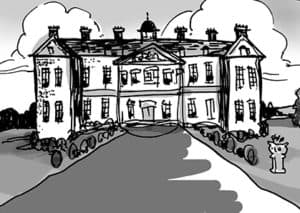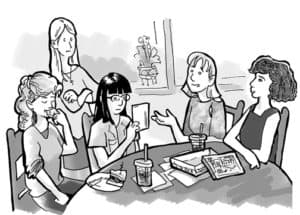Hopefully, this last short story in A Year of Every Tuesday offered a bit of respite. I never intend things to get heavy or tragic, but in the course of exploring the life of faith lived out in these five characters, I veer into weighty stuff. Stories like “Labels” and even the faith question in “About a Baptism” took us into complex problems, and of course, we will still have to find out what Maggie’s problem is. So the book might have felt like tough going. Nothing like an old-fashioned murder mystery to change that up.
Isn’t that a strange way to feel? I am a great fan of murder mysteries, but I do sort of wonder at myself sometimes that I consider it a form of innocent relaxation. I’ll get back to that, but for now, let’s just put it out there that mysteries are a bit of fun.
Speaking of which, what about our “hostess,” Mrs. Felicity Higg?
A trifle-odd neighbor
“Then … you don’t help with problems?” Mrs. Higg inquired politely.
“Well, yes,” Photini stammered, still feeling flustered.
“And the rest of this?” Mrs. Higg went on, pointing at the paper. “Odd jobs done? Errands run? Lost things found? Mysteries solved?”
“Yesss, but …” Photini said, wishing furiously that they had been more successful in dialing back Xenia’s enthusiasm. “I know my mom didn’t mean to give you that.”
“Oh, what a shame,” Mrs. Higg frowned, sipping her coffee. “Because I’ve got one.”
“One what?”
“One … mystery,” Felicity twinkled. “I’ve got a mystery to solve, and I’d like to hire your Club to do it.”
I warned my husband, when he was proofreading the book for me, that there was some wishful thinking in the last story (which he immediately recognized when he got to it), but that he shouldn’t take any offense that my odd heroine is a widow. Mrs. Higg is a version of what I would come out like if I wasn’t married and had a lot of money to throw around. She’s also a kind of grown-up Pippi Longstocking, having none of the usual cares or social graces that others are burdened with.
I hope that readers enjoyed Mrs. Higg and her interesting tenant, Mr. Hanover. I’m pretty sure we’ll see them again in the next ETC book, and I’m toying with the idea of spinning off a mystery series. But in this case, she’s just our hostess, so to speak. Her only job is to introduce the girls to the Maybrooke Tragedy.
Murder most foul
(Quick spoiler alert: I’m going to go over the story assuming that anyone reading this has already made it to the end. If you haven’t, stop now and come back when you have — it’ll be a lot more fun that way.)
 The Maybrooke Tragedy is the type of thing that you see frequently in murder mysteries — an upper-class, British murder with some twists and turns. In fact, as Xenia is astute enough to realize, that is part of the problem with it, really. The whole thing doesn’t look like the sort of thing that happens in real life. But it does look like the kind of thing you encounter in the tropes and formulae of murder mysteries.
The Maybrooke Tragedy is the type of thing that you see frequently in murder mysteries — an upper-class, British murder with some twists and turns. In fact, as Xenia is astute enough to realize, that is part of the problem with it, really. The whole thing doesn’t look like the sort of thing that happens in real life. But it does look like the kind of thing you encounter in the tropes and formulae of murder mysteries.
I count myself as a diehard fan of murder mysteries, and I had been toying with the idea of writing one for years. But it continually surprises me that it is subjugated to the role of “comfy” reading. The truth of it, it seems to me, is that it’s literature that has at its center perhaps the worst crime any of us can commit, and a sin against God that is always catastrophic. So there were two things I wanted to try to get at with the Maybrooke Tragedy:
- That a murder is always one of those events that creates ripples and aftershocks, some of which go on for generations. That’s what sensitive Photini feels, since she is the one who gets the most immersed in the data of the mystery: “I want to finish this assignment for Mrs. Higg and then forget about it. There’s something evil about all of this, and I kind of wish I had never started with it.”
 That there are endless lessons in psychology hidden in this deceptively simple literary form. Usually, solving the crime doesn’t have as much to do with processing data, comparing timelines and all that as it does with understanding the people involved and figuring out their motivations. Long after the other puzzles of the Maybrooke Tragedy are solved, we have a stark picture of what happened: A cold-hearted, ungenerous man became suddenly furious when the one thing he cared about — his ancestral home — was maligned. Everything that happened after that was the product of Lord Maybrooke’s attempt to avoid punishment. In the end, the coded last words are his admission that he failed — he couldn’t escape his own conscience, and he had to admit that he was the murderer, even if he did it in a form that was all but unreadable.
That there are endless lessons in psychology hidden in this deceptively simple literary form. Usually, solving the crime doesn’t have as much to do with processing data, comparing timelines and all that as it does with understanding the people involved and figuring out their motivations. Long after the other puzzles of the Maybrooke Tragedy are solved, we have a stark picture of what happened: A cold-hearted, ungenerous man became suddenly furious when the one thing he cared about — his ancestral home — was maligned. Everything that happened after that was the product of Lord Maybrooke’s attempt to avoid punishment. In the end, the coded last words are his admission that he failed — he couldn’t escape his own conscience, and he had to admit that he was the murderer, even if he did it in a form that was all but unreadable.
This was a chance for our five girls to team up on something, and I really needed all of them. As always, Xenia’s penchant for tumbling onto what’s illogical and out of place came in handy. But it took Photini’s knowledge of Orthodox things to see the answer that was right in front of them.  (By the way, I had been holding onto the idea of using those little differences in the Septuagint since I first found about them. I’ve read any number of Agatha Christie mysteries that turn on the fact that in the Russian alphabet, certain letters are different than the “normal” alphabet. If she could make something so trivial her hook, it seemed to me that the renumbering of psalms in the Septuagint was at least that good.)
(By the way, I had been holding onto the idea of using those little differences in the Septuagint since I first found about them. I’ve read any number of Agatha Christie mysteries that turn on the fact that in the Russian alphabet, certain letters are different than the “normal” alphabet. If she could make something so trivial her hook, it seemed to me that the renumbering of psalms in the Septuagint was at least that good.)
I needed Abigail’s typical imaginative bent to make clear what Xenia couldn’t quite put her finger on: that Lord Maybrooke had actually staged things at the trials. Vanessa is always handy for asking questions and making comments that the others want to say but can’t bring themselves to. And Maggie’s role was as a kind of outsider.
Maggie was distracted through most of this story — attending to the business at hand, but not really there somehow. That’s because she has her own situation going on at the time the ETC is solving the mystery. And she has a little tragedy of her own. But we’ll get back to that in the next post, when we finish up the book and finally get to the bottom of what has been bothering Maggie.